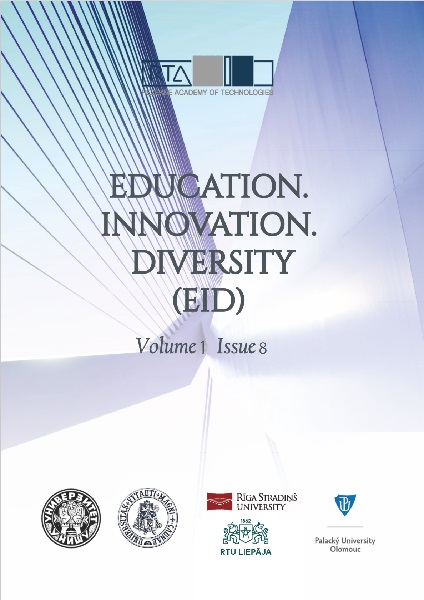PREREQUISITES FOR ADULT PROFESSIONAL DEVELOPMENT IN THE CONTEXT OF LIFELONG LEARNING
DOI:
https://doi.org/10.17770/eid2024.1.7925Keywords:
in-service training, lifelong learning, professional developmentAbstract
The development of the world of technology implies the continuous improvement of adult knowledge and the acquisition of new knowledge. Today's rapid development of artificial intelligence and technology is replacing several professions where a robotic process replaces the human factor. To be competitive in the labor market, an employee needs to continuously improve his or her existing knowledge or even learn a new profession, while for a company to be active and up-to-date in its sector, it is necessary not only to develop technologically but also to educate its employees. The aim of the study: to explore the possibilities for improving the professional development and lifelong learning model based on the existing learning model in the institution - X. The basis for the study the employees of the institution X, who are in a continuous learning process, both in the context of professional development and lifelong learning. Research methods: theoretical literature review and empirical research method-survey. The research data show that the training model at the institution X is developed on the principle of non-formal education and corresponds to the main ideas of lifelong learning; the problematic issues are related to the high volume of work, which results in the respondents’ inability to fully participate in new in-service training courses and the content being repeated; also, no survey is conducted among the employees of the institution X before the training content is developed. On the other hand, a higher percentage of respondents join additional training courses offered and are positive about the courses where participation is required. The survey data shows that staff members are familiar with the content of the mandatory training courses as well as with the additional training courses offered for both professional and personal development, where a higher percentage of respondents apply the knowledge acquired in their daily work.
References
Aase, G. (2001). Kā mācās pieaugušie. Rīga: Poligrāfists
Aizsila, A. (2010). Pedagogu tālākizglītības programmas realizācija. LLU Izglītības un mājsaimniecības institūts. Retrieved from: https://llufb.llu.lv/proceedings/n24/9/LLU_raksti_Nr24-76-85.pdf
Anužienė, B., Tolutienė, G. & Zubrickienė I. (2021). Chages to staff training startegies in a business organisation in terms of learning and competence development. SOCIETY. INTEGRATION. EDUCATION Proceedings of the International Scientific Conference. Volume IV, May 28th-29th, 2021, 30-47. DOI: https://doi.org/10.17770/sie2021vol4.6253
Aspin, D. (2007). Philosophical Perspectives on Lifelong Learning. Lifelong Learning Book Series, vol 11. DOI:10.1007/978-1-4020-6193-6_2
Beinicke, A., Bipp, T., Oberlander, M. (2020). Digital competencies: A review of the literature and applications in the workplace. Computers & Education, 146. DOI: https://doi.org/10.1016/j.compedu.2019.103752
Boud, D., Garrick, J. (1999). Understanding Learning at Work. London: Routledge
Buls, Z. (2017). Cilvēka attīstība mūžizglītības kontekstā. EPALE - Eiropas pieaugušo mācīšanās elektroniskā platforma. Retrieved from: https://epale.ec.europa.eu/lv/blog/cilveka-attistiba-muzizglitibas-konteksta
Chan, E., Daneshgar, F., Vantoorn, C (2008). E-Learning in Workplaces. DOI: https://doi.org/10.1109/ITICT.2008.4806643
Goldman, J., Kitto, S., Schmitt, M.H. & Olson C.A. (2014). Examining the intersections between continuing education, interprofessional education and workplace learning. Journal of Interprofessional Care, Volume 28, 2014 - Issue 3: Special Themed Section: Workplace Learning and Continuing Interprofessional Education, 183-185. DOI: Ivanova, I. (2022). „Mācīšanās darba vietā” jēdziena attīstība un tās būtība. Retrieved from: https://epale.ec.europa.eu/lv/blog/macisanas-darba-vieta-jedziena-attistiba-un-tas-butiba
Ivanova, I. (n.d.). Pieaugušo mācīšanās īpatnības. Retrieved from: https://epale.ec.europa.eu/sites/default/files/i_ivanova_pieauguso_macisanas_ipatnibas_31_08_11.pdf
Izglītības un zinātnes ministrija (2020). Pieaugušo izglītība. Retrieved from: https://www.izm.gov.lv/lv/pieauguso-izglitiba
Keegan, B.P., Matas, S.D. (2020) . A Case Study on Adult and Workplace Learning. Education and Management Engineering, 1, 11-19. DOI: 10.5815/ijeme.2020.01.02
Latvijas Pieaugušo izglītības apvienība (2007). Ceļā uz mūžizglītību. Mūžizglītības politika Latvijā. Rīga: Latvijas Pieaugušo izglītības apvienība.
Martinsone, K. (2012). Pieaugušo izglītība. Rīga: Raka
Nodarbinātības valsts aģentūra (2022). Darba devēju ekspresaptaujas ziņojums “Darba devējiem nepieciešamās darbinieku prasmes”. Retrieved from: https://www.nva.gov.lv/lv/jaunums/publicets-darba-deveju-ekspresaptaujas-zinojums-darba-devejiem-nepieciesamas-darbinieku-prasmes?utm_source
Puriņa, D. (2022). „Mācīšanās darba vietā” jēdziena attīstība un tās būtība. Retrieved from: https://epale.ec.europa.eu/lv/blog/macisanas-darba-vieta-jedziena-attistiba-un-tas-butiba
Vaughan, K. (2008). Workplace Learning: A Literature Review. Retrieved from: https://www.academia.edu/2057544/Workplace_learning_A_literature_review
Tynjala, P. (2007). Perspectives into learning at the workplace. Educational Research Review Volume 3, Issue 2, 130-154. DOI: https://doi.org/10.1016/j.edurev.2007.12.001
Downloads
Published
Issue
Section
License
Copyright (c) 2024 Education. Innovation. Diversity.

This work is licensed under a Creative Commons Attribution 4.0 International License.






